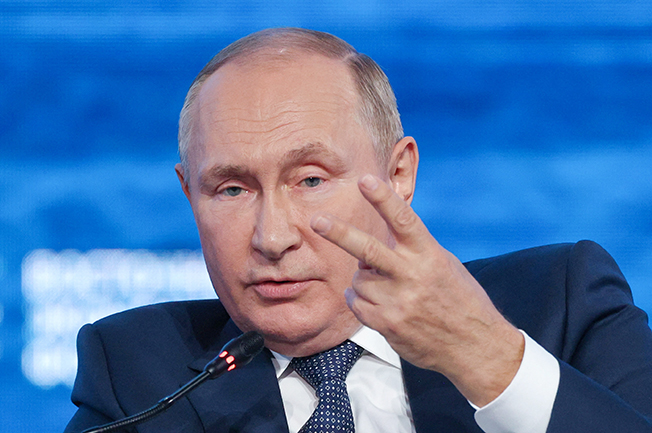President Vladimir Putin ordered the mobilisation of hundreds of thousands of Russians to fight in Ukraine on Wednesday, while moving to annex Ukrainian territory and making what Washington denounced as an overt threat to use nuclear weapons.
Western officials called the moves reckless acts of desperation by a leader facing the prospect of defeat on the battlefield after seven months of war against a smaller foe, and predicted they would do little to salvage Russia’s war effort.
Flights out of Russia quickly sold out following Putin’s announcement, while jailed opposition leader Alexei Navalny called for mass demonstrations against the mobilisation.
A monitoring group said more than 100 people were arrested in protests in the hours after Putin’s speech.
In a country that counts millions of former conscripts as reservists, Putin’s “partial mobilisation” decree did not spell out who would be called up. Defence Secretary Sergei Shoigu said 300,000 people would be mobilised from a pool of 25 million. Contracts of professional troops would be extended indefinitely.
Putin effectively announced plans to annex four Ukrainian provinces, saying Moscow would assist with referendums on joining Ukraine’s Luhansk, Donetsk, Zaporizhzhia and Kherson regions to Russia, and implement the results.
A day earlier, Russian-installed officials in the four regions announced plans for such votes from later this week, which Western countries denounced as sham plebiscites.
Putin said, offering no evidence, that officials in NATO states had threatened to use nuclear weapons against Russia, but should know that “the weathervane can turn towards them”.
Russia “also has various means of destruction”, he said. “When the territorial integrity of our country is threatened, we will certainly use all the means at our disposal to protect Russia and our people. It’s not a bluff.”
Biden, in a speech to world leaders at the U.N. General Assembly responded: “Again, just today, president Putin has made overt nuclear threats against Europe, in a reckless disregard for the responsibilities of the non-proliferation regime.”
Ukrainian President Volodymyr Zelenskiy said he thought Putin would be unlikely to use nuclear weapons but that the threat showed why it was important to stand up to him.
“I don’t believe that he will use these weapons. I don’t think the world will allow him to use these weapons,” Zelenskiy said in remarks reported by Germany’s Bild newspaper.
“Tomorrow Putin can say: ‘Apart from Ukraine, we also want a part of Poland, otherwise we will use nuclear weapons.’ We cannot make these compromises,” Zelenskiy said.
DANGEROUS AND RECKLESS
Calling a mobilisation in Russia is a gamble for Putin, after months in which the Kremlin had promised it would do no such thing.
The war has enjoyed popular support in a country where independent media have all been shut down and all public criticism of the “special military operation” is banned.
For many ordinary Russians, especially in the urban middle classes, the prospect of being called up to fight would be the first hint of the war affecting them personally.
“It is clear that the criminal war is getting worse, deepening, and Putin is trying to involve as many people as possible in this,” jailed opposition leader Navalny said in a video message from jail recorded and published by his lawyers.
“He wants to smear hundreds of thousands of people in this blood.”
By 1530 GMT, Russian police had detained more than 100 across Russia for protesting against the mobilisation, the independent protest monitoring group OVD-Info said.
In an interview with Reuters, NATO Secretary-General Jens Stoltenberg denounced Putin’s threat to use nuclear weapons as “dangerous and reckless rhetoric” and said the mobilisation plan demonstrated “that the war is not going according to his plans”.
As for any potential Russian use of nuclear arms, “We will make sure that there is no misunderstanding in Moscow about exactly how we will react,” Stoltenberg said. “The most important thing is to prevent that from happening and that is why we have been so clear in our communications with Russia about the unprecedented consequences.”
In his speech to the U.N. General Assembly, Biden said Russia had violated the U.N. charter by invading a neighbouring state.
“This war is about extinguishing Ukraine’s right to exist as a state, plain and simple, and Ukraine’s right to exist as a people,” the American president said. “Wherever you are, wherever you live, whatever you believe…. That should make your blood run cold.”
‘JUSTIFYING FAILURE’
Putin’s announcement came after weeks in which Russia’s invasion force was routed in northeastern Ukraine, with thousands of Russian troops fleeing frontline positions in the biggest shift in momentum since the war’s early weeks.
Ukrainian forces have captured some of the main supply routes that had served Russia’s front line in the east, and say they are now poised to push deeper into territory that Moscow had captured over months of heavy fighting.
“No amount of threats and propaganda can hide the fact that Ukraine is winning this war, the international community are united and Russia is becoming a global pariah,” said British Defence Secretary Ben Wallace.
Zelenskiy adviser Mykhailo Podolyak said Putin’s address “looks more like an attempt to justify their own failure”.
“The war is clearly not going according to Russia’s scenario and therefore required Putin to make extremely unpopular decisions to mobilise and severely restrict the rights of people,” Podolyak told Reuters in a text message.
Several Western military experts said drafting in hundreds of thousands of new troops would take months, do little to slow Russia’s losses, and could even make matters worse by drawing resources away from the battlefield to train and equip recruits.
“Jaw-dropping. A new sign of RU weakness,” tweeted Mark Hertling, a former commander of U.S. ground forces in Europe. “Placing ‘newbies’ on a front line that has been mauled, has low morale & who don’t want to be (there) portends more RU disaster.”







Click here to change your cookie preferences